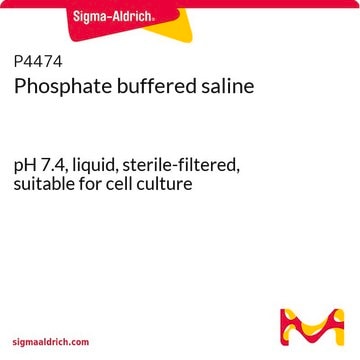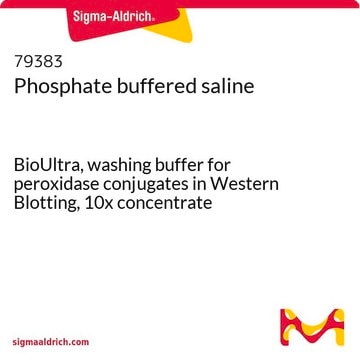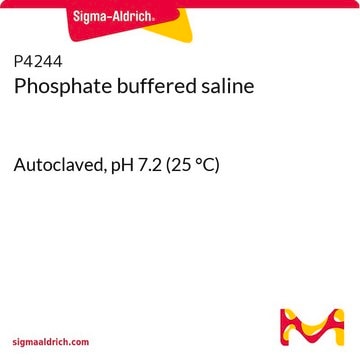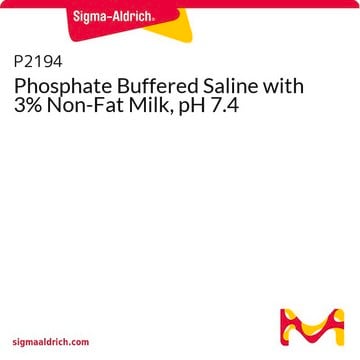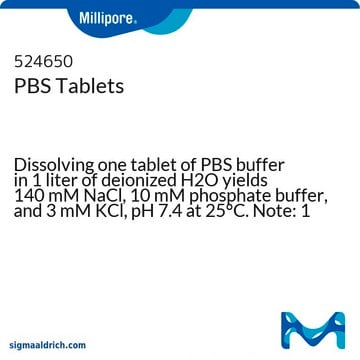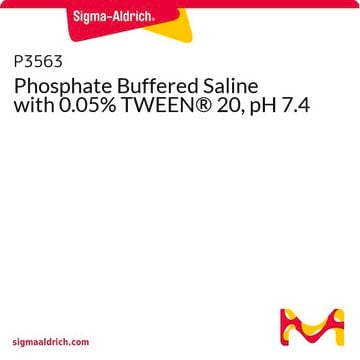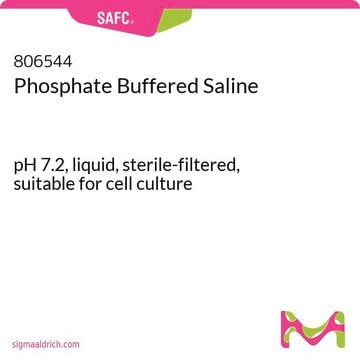P38135
Phosphate buffered saline
powder, pH 7.4, for preparing 5 L solutions
Synonym(s):
PBS
Sign Into View Organizational & Contract Pricing
All Photos(1)
About This Item
Recommended Products
product name
Phosphate buffered saline, powder, pH 7.4, for preparing 5 L solutions
Quality Level
form
powder
pH
7.4
solubility
water: soluble
application(s)
diagnostic assay manufacturing
Looking for similar products? Visit Product Comparison Guide
Application
- Evaluation of anthelmintic efficacy of ethanolic leaf extract of Juglans regia L. on Ascaridia galli: a comprehensive in vitro and in vivo study.: This study explores the use of phosphate buffered saline as a diluent in testing the anthelmintic properties of Juglans regia leaf extract, providing valuable insights into its potential for parasitic control in veterinary applications (Mir et al., 2024).
- Swelling kinetics of mixtures of soybean phosphatidylcholine and glycerol dioleate.: This study utilizes phosphate buffered saline to analyze the behavior of lipid mixtures, contributing to better understanding of biomaterials used in medical and cosmetic industries (Engstedt et al., 2024).
Packaging
Foil pouches
Reconstitution
Contents of one pouch, when dissolved in 5 liters of distilled or deionized water, will yield 0.01 M phosphate buffered saline (NaCl 0.138 M; KCl - 0.0027 M); pH 7.4, at 25 °C.
related product
Product No.
Description
Pricing
Storage Class Code
13 - Non Combustible Solids
WGK
WGK 1
Flash Point(F)
Not applicable
Flash Point(C)
Not applicable
Certificates of Analysis (COA)
Search for Certificates of Analysis (COA) by entering the products Lot/Batch Number. Lot and Batch Numbers can be found on a product’s label following the words ‘Lot’ or ‘Batch’.
Already Own This Product?
Find documentation for the products that you have recently purchased in the Document Library.
Customers Also Viewed
Chung Y Cho et al.
Analytical and bioanalytical chemistry, 407(14), 4195-4206 (2015-03-31)
To help safeguard the food supply and detect the presence of undeclared food allergens and gluten, most producers and regulatory agencies rely on commercial test kits. Most of these are ELISAs with a few being PCR-based. These methods are very
Mohidus Samad Khan et al.
Colloids and surfaces. B, Biointerfaces, 132, 264-270 (2015-06-09)
Viruses cause many infectious diseases and consequently epidemic health threats. Paper based diagnostics and filters can offer attractive options for detecting and deactivating pathogens. However, due to their infectious characteristics, virus detection using paper diagnostics is more challenging compared to
Timothy J Green et al.
Fish & shellfish immunology, 47(1), 435-443 (2015-09-20)
The host-pathogen interactions between the Pacific oyster (Crassostrea gigas) and Ostreid herpesvirus type 1 (OsHV-1) are poorly characterised. Herpesviruses are a group of large, DNA viruses that are known to encode gene products that subvert their host's antiviral response. It
Yong N Li et al.
The Journal of comparative neurology, 516(5), 442-453 (2009-08-06)
Horizontal cells (HCs) are involved in establishing the center-surround receptive field organization of photoreceptor and bipolar cells. In many species, HCs respond differentially to colors and may play a role in color vision. An earlier study from our laboratory suggested
S Vaddiraju et al.
Biosensors & bioelectronics, 24(6), 1557-1562 (2008-10-01)
The performance of an implantable glucose sensor is strongly dependent on the ability of their outer membrane to govern the diffusion of the various participating species. In this contribution, using a series of layer-by-layer (LBL) assembled outer membranes, the role
Our team of scientists has experience in all areas of research including Life Science, Material Science, Chemical Synthesis, Chromatography, Analytical and many others.
Contact Technical Service


